This is a hard column to write, but I have felt led to do this for a while, now. We have a lovely Advent book list in the wings, but need to do this first. A few customers asked, so here we are: a few recommended titles to help us think about the ongoing sorrows in the Middle East.
Please know this isn’t comprehensive; it’s not even close to all of the titles we have on our shelves on this topic here at the Dallastown shop. We may be a small-town bookstore but we’ve carried a wide range of selections about this topic since we opened almost 40 years ago. And we still have some on the shelf, solid, if a little dated.
In this arena, there are so many adjacent topics, too, on which we have many good books— from Christian-Muslim dialogue (and evangelism) to theological questions about Christians and Jews and the God of the Hebrew Bible, not to mention Christian postures towards the secular nation of Israel. How to grapple with a just response to terrorism has been a hot topic since even before 9 -11 and we are glad for those who raise profound questions about the nature of such a fight. Of course there are questions of what sorts of principles or values should guide US foreign policy and their relationship to Biblical teachings about peace and public justice.
I have been engaged in some good discussions online in recent weeks with a handful of friends who take issue with my own calls for a cease fire in the war in Gaza. Everyone I know (except for some extreme Trump followers) opposes Russian aggression in Ukraine. But regarding Israel’s war in Gaza, views are seriously divided. Those I’m reading, and friends who write to me, are good thinkers, well-informed historically, and most are deeply agonized by the horrors that they believe need to be inflicted on the terrorists who have been a vile menace to Israel for decades.
We should all be shaken by the horrific massacre of innocent civilians in Israel on October 7th. There is no justification at all, ever, for such gross evil.
Still, everyone should know that this whole last year has been an increasingly dangerous time in the Gaza Strip with an unusual number of Palestinian deaths, long before the atrocities committed by Hamas on 10-7. This has long been more than a cold war; my own friends with connections in the region are all just devastated. Please pray.
I observe two things about my friends who routinely try to hold my pacifist feet to the fire. One is related, or so it seems to me, to the thesis of that famous book by Mark Noll, The Scandal of the Evangelical Mind; they send me articles from nothing but secular sources. That they are often from unusual, far-right papers only highlights the main problem of Christian citizens forming their opinions largely by reading secular thinkers and ideologically-driven reporters. From this camp, there seems to be no desire to “think Christianly” or to nurture the particular habits of the Christian mind; they seem immune to concerns found in Noll et al and offer nothing theological, distinctive, uniquely Christian. This is not good.
For instance, a person of long involvement in church life (in a conservative church more fussy about doctrinal details than most) has little to no theological substance to his opinions, knowledgeable about one side of the conflict as he may be. I don’t know if he is right or not, but his method, the way he comes to his political opinions, are, for a serious Christian, wanting, if not scandalous. When he is advocating for violent methods to achieve the peace of Jerusalem, I keep pressing for a methodology to his analysis that is consistently Christian. A simple read like The Liturgy of Politics: Spiritual Formation for the Sake of Our Neighbor by Kaitlyn Schiess (IVP; $18.00 – OUR SALE PRICE = $14.40), which asks how we form our political opinions, would be good for such folks. I also recommend the heavier, more scholarly call to resist ideologies of both the left and the right, found in the brilliant Political Visions & Illusions: A Survey & Christian Critique of Contemporary Ideologies by David Koyzis (IVP Academic; $35.00 – OUR SALE PRICE = $28.00.)
Another concern about recent discourse here in my inbox. One correspondent essentially thinks that the direct teachings of Jesus and Paul are not exactly relevant in the public complexities of contemporary geo-politics. He is a principled guy, morally serious, ethical, even, and I admire him immensely. His ethical approach seems to be one of counting up the greatest good outcome and then sadly limiting overt Biblical political teachings. Some thinkers in this camp call themselves realists, admitting that their approach smacks of pragmatism, teetering near the bad adage that “the end justifies the means.” Some who tend to think like this wouldn’t exactly say out loud that specific Bible texts are inadequate for social ethics but might say that as we use our sanctified imaginations to “work out with fear and trembling” our views, we can support terrible violence as the least of other awful options, no matter what a Bible prooftext says.
One guy worries that my own tendencies to side with the most suffering people — clearly in this situation the Palestinians and civilians in devastated Gaza — is naive. Even if motivated by a desire to show God’s love and follow Christ’s command to be peacemakers, hopes for diplomacy and gospel-centered peacemaking initiatives finally are unhelpful (they say) as such proposals fail to deal adequately with real evil; in this case the deep hatred of many Jihadists (and fighters in Hamas) and their tenacity in their goal to destroy Israel. Not a few Christian pundits have been saying this lately, at least those who justify the thousands being killed in Gaza. (Many other generic evangelical folks I see on Facebook and other places don’t even try to think Christianly/ethically about the war, they just parrot the uncritical, pro-Israel line that they somehow think is proper. I guess they’ve never read Amos or Jeremiah.)
I do not believe it, exactly, but it is a helpful way to remind us of the complexity of Middle Eastern peace talks: some say that if Palestinians lay down their arms there could be Middle East peace but if Israel lays down their arms, they would be annihilated by those who have promised to do so.
Do the Bible and the teachings of the Lord Jesus matter in a world like this? Is there a way to lean into the thrust of the Scriptures’ call for reconciliation, for us to take up the way of Jesus and to be lovers of enemies and peacemakers, without being naive or resorting to immature proof-texting? What should honest, Biblically-shaped citizens think and do in this fallen world? These are admittedly big, hard questions. Most of us just gape at the complexity and struggle to discern some good thing we can do.
+++
A FEW MOSTLY RECENT BOOKS ABOUT WAR and CHRISTIAN FAITH
Before we look at a handful of books about the Middle East, and particularly the Israeli/Palestinian conflicts, here are a few titles to help us think about the hard teachings of Jesus about what some call Biblical nonviolence and the more typical position that suggests that war is sometimes the best option, even for those who love God and want to do right in the world.
I’ve written about this before and commend at least these two BookNotes columns to you: HERE and HERE, for instance. Use the search bar at the website to perhaps find other pieces I’ve written.
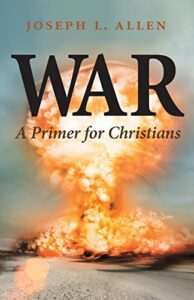 War: A Primer for Christians Joseph Allen (Texas A&M University Press) $14.99 OUR SALE PRICE = $11.99
War: A Primer for Christians Joseph Allen (Texas A&M University Press) $14.99 OUR SALE PRICE = $11.99
This is as thin and easy a book on the topic as you’ll find, an entry-level overview of three perspectives. It has succinct chapters on those who hold to Biblical nonviolence, seeing all war as always sinful, those who hold to the historical just war theory (a model that allows that war might be the tolerable, best option to restore just order, even if it must be determined to be legitimate and constrained) and those who fall into a crusading mentality, suggesting it is God’s will and a noble thing to fight for the good.
Too many fall into that foolish third option, I think, but the debate between the two responsible options down through church history, remains a live conversation. This little book is a fine orientation to the different views.
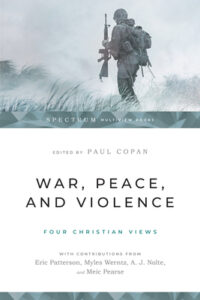 War, Peace, and Violence: Four Christian Views edited by Paul Copan (IVP Academic) $26.00 OUR SALE PRICE = $20.80
War, Peace, and Violence: Four Christian Views edited by Paul Copan (IVP Academic) $26.00 OUR SALE PRICE = $20.80
This is one of those great back and forth volumes with four different authors from four different perspectives. When you are finally done, you’ve got four main arguments under your belt, and everybody’s rebuttals. What a classroom this book can be. (And only in about 225 admittedly dense pages.) I very highly recommend it.
You’ll have to get into it yourself to see how compelling each argument can be but the four views are described as a “just war view”, a “Christian realist view”, a “nonviolence view”, and a “church historical view.” All of these writers are dedicated Christians and good scholars of topics such as Christian ethics, political philosophy, and international affairs. In a sense, two have two different takes on why Christians should sometimes go to war and two others are less clear about that, standing with those who resist the worldliness and brokenness of war.
Is coercive force and the violence of war ever legitimate? Must Christians always advocate that their country turn the other cheek? Are pacifists who take Jesus’ injunctions literally the only ones that can help us do justice and love mercy? If we should endorse war, are there ethical limits that must constrain the waging of battle? These are huge questions for any time and in any place, but are burning for us now. Please consider this book.
(For what it is worth we have a copy or two of a very old book just like this, published in the 1970s by IVP called War: Four Christian Views edited by Herman Hoyt.)
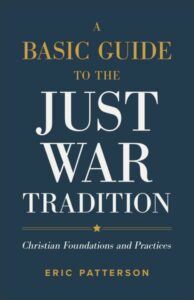 A Basic Guide to the Just War Tradition: Christian Foundations and Practices Eric Patterson (Baker Academic) $22.99 OUR SALE PRICE = $18.39
A Basic Guide to the Just War Tradition: Christian Foundations and Practices Eric Patterson (Baker Academic) $22.99 OUR SALE PRICE = $18.39
Patterson is a scholar-at-large who has served in the US military and at the US State Department. I’ve read a number of books about the history and execution of the just war theory and this may be the very best. It is thoughtful but lively, a very accessible introduction showing, then, how the just war theory works out in a number of specific areas of statecraft and security issues. I highly recommend it.
Patterson has written widely on public theology and international issues, including the 2022- released, edited volume, an anthology (co-edited with Robert Joustra) Power Politics and Moral Order: Three Generations of Christian Realism: A Reader (Cascade Books; $39.00.)
A Basic Guide to the Just War Tradition has been getting great reviews, too.
A marvelously clear book on just war. Patterson shows a profoundly deep grasp of the two-thousand-year-old Christian tradition by explaining when war is just and when believers may participate. This is no dry treatise; it is loaded with examples: from The Hunger Games to Harry Potter, from The Lord of the Rings to Narnia–not to mention Augustine, Tertullian, and Origen. A must-read for church leaders.” — Captain David Iglesias, JAG, US Navy (retired); Wheaton Center for Faith, Politics, and Economics, Wheaton College
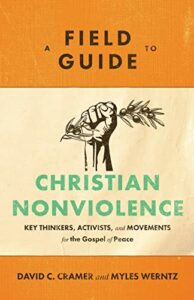 A Field Guide to Christian Nonviolence: Key Thinkers, Activists, and Movements for the Gospel of Peace David C. Cramer and Myles Wentz (Baker Academic) $21.99 OUR SALE PRICE = $17.59
A Field Guide to Christian Nonviolence: Key Thinkers, Activists, and Movements for the Gospel of Peace David C. Cramer and Myles Wentz (Baker Academic) $21.99 OUR SALE PRICE = $17.59
It may be that this book — co-authored by a Mennonite with a PhD from Baylor and a Baptist professor from Abilene Christian University — is one of the most indispensable such books offering excellent and fresh explorations about the Biblical basis for peacemaking. It looks at eight slightly different forms/styles of Christian nonviolence — who knew? As Eric Gregory of Princeton University writes, “this book lifts up diverse representatives that reveal the breadth and urgency of Christian nonviolence in a world where violence wears many faces. This accessible volume is highly recommended for the church… and all who care about peace.” Yes!!
Whether you argue with their interpretations or relish the gift of their expansive vision, you will find an impressive Christian exploration of lived practices and traditions of nonviolence. — Traci C. West, Drew Theological School
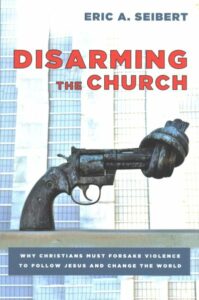 Disarming the Church: Why Christians Must Forsake Violence to Follow Jesus and Change the World Eric A. Seibert (Cascade) $40.00 OUR SALE PRICE = $32.00
Disarming the Church: Why Christians Must Forsake Violence to Follow Jesus and Change the World Eric A. Seibert (Cascade) $40.00 OUR SALE PRICE = $32.00
I bristle at the high price, but the book is almost 325 pages and covers as much as almost any we know. It has Biblical study, theological reflections, true stories and careful analysis leading to concrete proposals for conflict resolution and hope for a better way that war and violence.
Dr. Eric Seibert is a Professor of Old Testament near us at Messiah College and has struggled long with healthy approaches to the ugly and violent texts of the Bible discerning how to use them within the church and public life. This fairly recent book is a major compendium of much that should be known, moving from Biblical studies to practical application in both international issues, and in our personal lives. Whether you are most interested in the basic doctrinal/Bible content or the complicated geo-political concerns or how to be a peacemaker in various aspects of daily life, there is much here. What a book.
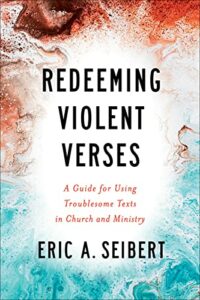 Dr. Siebert’s brand new one, by the way, is Redeeming Violent Verses: A Guide for Using Troublesome Texts in Church and Ministry (WJK; $25.00; OUR SALE PRICE = $20.00.)
Dr. Siebert’s brand new one, by the way, is Redeeming Violent Verses: A Guide for Using Troublesome Texts in Church and Ministry (WJK; $25.00; OUR SALE PRICE = $20.00.)
It makes a case why we should include these hard passages in preaching and Christian education and offers seven constructive ways to do so. It is readable and well-considered, with good reviews from Philip Jenkins, Caryn Reeder, O. Wesley Allen, and others. Adam Hamilton says, “Every pastor and those responsible for teaching children and youth in the church should read this book.” Wow.
 Speak Your Peace: What the Bible Says about Loving Our Enemies Ron Sider (Herald Press) $16.99 OUR SALE PRICE = $13.59
Speak Your Peace: What the Bible Says about Loving Our Enemies Ron Sider (Herald Press) $16.99 OUR SALE PRICE = $13.59
I recommend this whenever anyone asks (rare as it is, admittedly) for an easy to read, Biblically-sound, evangelically-grounded, nicely written survey of the topic of Biblical nonviolence. It is an adapted, easier-to-use version of one of Ron’s major works, If Jesus Is Lord: Loving Our Enemies in an Age of Violence (Baker Academic; $28.00 – OUR SALE PRICE = $22.40.) Whether you chose the adapted, shorter edition or the bigger one, everybody should grapple with this beautifully compelling stuff. As Duke’s Stanley Hauerwas writes in the foreword of, “By providing close readings of Jesus’ work and teachings, Sider helps us see that nonviolence is not a side issue in Jesus’ ministry, but rather is at the very heart of the kingdom Jesus proclaimed.”
In times when most Christian institutions are focused on how to preserve, protect, and gain more earthly positions, a prophetic voice emerges to remind us of our core calling and duty in life as followers of Christ. As does any prophet in history, Ron Sider reminds us and challenges us to become the true peacemakers that Christ calls us to be. —Sami Awad, founder and programs developer of Holy Land Trust
Speak Your Peace is a timely word in a world where violence is a daily global occurrence. Ron Sider’s love for Jesus, Scripture, and others comes through in his humble and thorough exploration of nonviolence as radical action. Sider dares us to consider Jesus’ call to love our enemies not as an idealistic goal, but as a realistic policy to be implemented in word and deed by individuals and communities. — Kathy Khang, co-author of Loving Disagreement and Raise Your Voice.
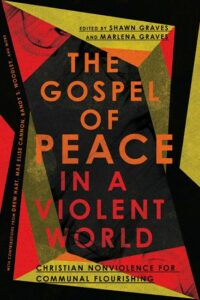 The Gospel of Peace in a Violent World: Christian Nonviolence for Communal Flourishing edited by Shawn Graves & Marlena Graves (IVP Academic) $40.00 OUR SALE PRICE = $32.00
The Gospel of Peace in a Violent World: Christian Nonviolence for Communal Flourishing edited by Shawn Graves & Marlena Graves (IVP Academic) $40.00 OUR SALE PRICE = $32.00
If ever there was a book that proves the silliness of the claim that theologically traditional evangelicals have little to say about social concerns or public ethics, this surely lays that old story to rest. Shawn and Marlene are pious, Godly folks and sharp scholars. They’ve spent enough time in the trenches of activism to know the important issues and they know their Bibles well enough to weigh in thoughtfully and graciously. It is a bit on the academic side, but, whew, what a fresh batch of essays and a great resource this is. I have announced it before, but it’s good to recommend it again, now, when it is so needed as the world’s issues are pressing down upon us urgently.
Here in The Gospel of Peace they have gathered contributions from all sorts of pastors, theologians, peace activists and social change practitioners, showing how a Biblical nonviolence framework can help bring light and hope around any number of contentious issues, from race and gender to disability and immigration. A holistic vision of shalom will call us to resist war but to work against food insecurity, to care for the ecology of Earth and the outcasts on the earth.
I’ve raved about this grand resource before, and think it is useful now more than ever. There are (to just name a few) contributors such as Drew Hart, Mae Elise Cannon, Randy Woodley, Kathy Kang, Ted Grimsrud, Lisa Sharon Harper, Thomas Yoder Neufeld, and more. Hooray.
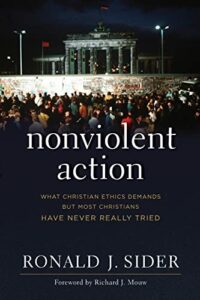 Nonviolent Action: What Christian Ethics Demands But Most Christians Have Never Really Tried Ronald J. Sider (Brazos Press) $19.99 OUR SALE PRICE = $15.99
Nonviolent Action: What Christian Ethics Demands But Most Christians Have Never Really Tried Ronald J. Sider (Brazos Press) $19.99 OUR SALE PRICE = $15.99
Those who follow the just war theory — as does the Reformed thinker Richard Mouw, who wrote the excellent forward — are supposed to believe that war is to be a last ditch effort. Every imaginable option is to be tried before moving to death and destruction. In this extraordinary book — drawn somewhat on the classic research of Gene Sharp, among others — Sider documents how war has been turned away or lessened and mitigated the damage and suffering, when citizens unite to resist the war-makers. Can nonviolent direct action work? Can organized citizen action play a truly helpful role?
We know the famous stories of Gandhi and MLK in the racist American south, but are they just anomalies? Sider shows that, no, they are not. Nonviolent intervention has worked and sometimes worked remarkably well. This book was close to Ron’s heart as he attempted to make a case that Biblical nonviolence was not idealistic Mennonite wishful thinking, but should be aggressively pursued by people who claim to love the ways of Jesus. Sider’s Nonviolent Action is an exciting and inspiring book and, as Mouw and others have shown, it really is a must for those in the just war theory, who promise to support war only when it is the last resort after other peaceful efforts have been tried and found wanting.
Listen to Dr. Robert George, an esteemed, conservative ethicist at Princeton:
When Ron Sider talks, I listen. When he writes, I read. Whether or not one is a pacifist — I am not — one has something to learn about the power of nonviolent protest and resistance from Dr. Sider’s careful and thoughtful study of successful nonviolent movements against tyranny and oppression.
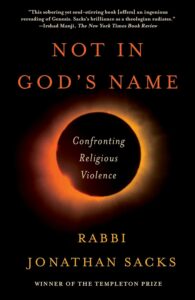 Not In God’s Name: Confronting Religious Violence Rabbi Jonathan Sacks (Schocken Books) $16.95 OUR SALE PRICE = $13.56
Not In God’s Name: Confronting Religious Violence Rabbi Jonathan Sacks (Schocken Books) $16.95 OUR SALE PRICE = $13.56
I do not want to spend too much time explaining the exceedingly thoughtful, deep, compelling, and wise insights from the late and greatly esteemed thinker and Jewish leader, Jonathan Sacks. Published in 2015, this was, still, seemingly done in the awful years after 9-11, with the wars in Iraq and Afghanistan and ISIS. Many of us in the West learned about suicide bombers and fatwas and jihad. Of course, Christians have their own ugly history of crusades and religious wars and disgusting inquisitions. It seems that from time past to now, God is used to motivate religious violence.
What does an astute scholar and Jewish leader say about all this? This book is nothing short of brilliant — and he warns that ISIS-like extremist attacks will be more prevalent as years march on. I highly recommend it for serious readers, those wanting an eloquent study of this complicated topic.
The rave reviews go on and on. Here are two:
Sacks’s sobering yet soul-stirring new book . . . [offers] an ingenious rereading of Genesis. . . . His brilliance as a theologian radiates. — Irshad Manji, The New York Times Book Review
Sacks’s analysis reflects an erudite mind fully engaged with philosophy, politics, and social studies of the most rigorous kind. It is when he turns his attention and all these resources to a theological engagement with the connection between religious faith and violence that he makes his greatest contribution . . . I cannot think of a more important new book for people of faith to read and study together . . . Jonathan Sacks is an enlightening presence for the whole world, and his message resonates today more powerfully than ever. — Michael Jinkins, President, Louisville Presbyterian Theological Seminary
ABOUT THE ISRAELI / PALESTINIAN CONFLICT
in no particular order…
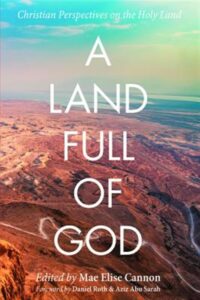 A Land Full of God: Christian Perspectives on the Holy Land edited by Mae Elise Cannon (Cascade Books) $40.00 OUR SALE PRICE = $32.00
A Land Full of God: Christian Perspectives on the Holy Land edited by Mae Elise Cannon (Cascade Books) $40.00 OUR SALE PRICE = $32.00
When I want a balanced, faithful, astute, and caring guide into the complexities of the Holy Land I think of Mae Elise Cannon and her leadership at the outstanding nonprofit ministry, Churches for Middle East Peace. With a PhD in history (and a speciality area of studies on the history of American Protestant church engagement in Israel and Palestine) and a host of books about the interface of spirituality and social justice, she is nothing short of an international treasure.
A Land Full of God (the back cover says) “gives American Christians an opportunity to promote peace and justice in the Israeli-Palestinian conflict. The 30-some essays are accessible, from diverse authors and perspectives, and sure to be received as immensely informative. From the historical, political, religious, and even geographic tensions, this book “walks readers through a biblical perspective of God’s heart for Israel and the historic suffering of the Jewish people, while also remaining sensitive to the experience an suffering of Palestinians.”
I like that they talk about being pro-Israel and pro-Palestine, for the poor and for public justice. Ultimately, it is “a pro-Jesus approach to bring resolution to the conflict.”
Ron Sider was still alive when this came out and he was happy to offer a lovely blurb. He was a friend to Mae and her team and admired them greatly. He wrote:
If you care about peace and justice in the land where Jesus lived and died, then read this excellent collection of thoughtful, probing essays from a wide range of viewpoints. The writers are scholars, pastors, activists, theologians, all struggling — from their vigorously different perspectives! — to be faithful to the Prince of Peace. A good read that will leave you much better equipped to understand all sides and therefore work more effectively for just reconciliation in the Holy Land.
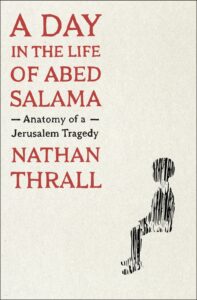 A Day in the Life of Abed Salam – Anatomy of a Jerusalem Tragedy Nathan Thrall (Metropolitan Books) $29.99 OUR SALE PRICE = $23.99
A Day in the Life of Abed Salam – Anatomy of a Jerusalem Tragedy Nathan Thrall (Metropolitan Books) $29.99 OUR SALE PRICE = $23.99
Several years ago there was a bus accident in Israel. The bus was filled with Palestinian school children. As Nathan Thrall explains in this captivating, immersive bit of world-class reporting (it has been called “luminous and “a masterpiece”) five-year old Milan Salama died in the crash. This is a gripping and poignant story of his father (Abed) as he gets word of the accident and sets out to find if his little boy is alive.
“The scene is chaos — the children have been taken to different hospitals in Jerusalem and the West Bank; some are missing and others cannot be identified.” Abed sets off on an odyssey, of sorts. It is, of course, every parent’s worst nightmare.
The dust jacket explains that horror is compounded by the “maze of physical, emotional, and bureaucratic obstacles that he must navigate because he is Palestinian. It was in the early parts of this book that I realized the accuracy of the apartheid (for which, you may recall, Jimmy Carter was criticized as it was in the title of his book on the Middle East conflicts.) From being on the wrong side of the separation wall, to holding the wrong ID to get t through military checkpoints, to having the wrong papers to enter Jerusalem, “Abed’s quest to find Milan is interwoven with the stories of a cast of Jewish and Palestinian characters who lives and histories unexpectedly converge.” The story has been acclaimed with Thrall being hailed for his “indelibly human portrait.”
Please read these illustrative endorsements. They are important.
I know of no other writing on Israel and Palestine that reaches this depth of perception and understanding… One could read the book as a précis of modern Palestinian history embedded in the personal memories of many individuals, each of them drawn in stark, telling detail. To get to know them even a little is a rare gift, far more useful than the many standard, distanced histories of Palestine. — David Shulman, New York Review of Books
Propels the reader across a geography that is partitioned behind walls and into enclaves, revealing in visceral, human detail what Israeli subjugation means, and how it shapes the most intimate corners of the Palestinian experience. With empathy and grace, Thrall transforms this incomprehensible, avoidable loss into an ode to a father’s love. — Tareq Baconi, author of Containing Hamas
Nathan Thrall’s book made me walk a lot. I found myself pacing around between chapters, paragraphs and sometimes even sentences just in order to be able to absorb the brutality, the pathos, the steely tenderness, and the sheer spectacle of the cunning and complex ways in which a state can hammer down a people and yet earn the applause and adulation of the civilized world for its actions. — Arundhati Roy, Booker Prizewinning author of My Seditious Heart
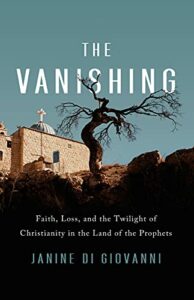 The Vanishing: Faith, Loss, and the Twilight of Christianity in the Land of the Prophets Janine Di Giovanni (Public Affairs) $30.00 OUR SALE PRICE = $24.00
The Vanishing: Faith, Loss, and the Twilight of Christianity in the Land of the Prophets Janine Di Giovanni (Public Affairs) $30.00 OUR SALE PRICE = $24.00
This is one of those little known books that has gotten extraordinary acclaim. Aidan Hartley of the Daily Telegraph says she is “One of our generation’s finest foreign correspondents.” While a write for the Financial Times says, commenting on how crucial it is to real the human stories behind the news, that “Janine Di Giovanni does this with heartbreaking eloquence” Michiko Kakutani wrote in the New York Times that Ms di Giovanni “writes here with urgency and anguish — determined to testify to what she has witnessed because she wants “people to never forget.”
Even the for the first five hundred years of its existence, the Christian church hardly left the Middle East — it spread to Egypt, Iraq, Palestine, and Syria. The Vanishing is, in a way, a study of how the story since then “is of a slow-moving catastrophe, a gradual but seemingly inexorable erasing of the Christian faith from the land its origins.”
Apart from the wars and persecutions of recent years, this is a fascinating and beautifully rendered story. She is a war reporter, though, and as she set out to document the stories of disappearing people, she traveled to “some the most beleaguer Christian outposts” (many that had been neglected or mostly abandoned. To get at what she is writing about, think of Iraq’s Assyrians to Egypt’s Copts, to the few remaining Gaza Christians. About a fourth of this remarkable 2021 book is set in Gaza.
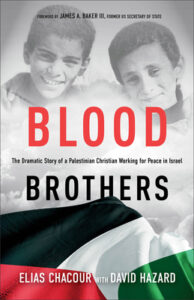 Blood Brothers: The Dramatic Story of a Palestinian Christian Working for Peace in Israel Elias Chacour (Baker Books) $16.99 OUR SALE PRICE = $13.59
Blood Brothers: The Dramatic Story of a Palestinian Christian Working for Peace in Israel Elias Chacour (Baker Books) $16.99 OUR SALE PRICE = $13.59
I will not go on and on about this as I am hoping you have heard of it. The book that first came out in the 1980s is now maybe in its fourth cover design and we have had them all. Elias Chacour is the Archbishop of the Melkite Church (with a degree not only from a seminary in Paris but from Hebrew University in Jerusalem) and is, to put it simply, considered the MLK of the Middle East. He is Arab (he grew up in a small Palestinian village in Galilee.) When the tens of thousands of Palestinians were killed (and nearly one million forced into refugee camps in 1948) Fr. Elias began “a long struggle with how to live out his personal spirituality.” As the back cover puts it, “In Blood Brothers he blends his riveting life story with historical and Biblical research to reveal a too-little known side of the Arab-Israeli conflict. It is an international bestseller and one of the most enduring books we’ve sold here in the past 40 years.
I’ve got some stories around this book, how it has influenced many — not to mention a fun story of how Chacour charmed his way into a Bible study at the home of then US Secretary of State, James Baker, shown hospitality by Baker’s wife, Susan. (Baker surprisingly met with him and they became dear friends in faith and now has a great afterword to the updated edition of Blood Brothers.) Elias Chacour has been nominated for the Nobel Peace Prize and we could pray that someday his witness will bear fruit. This book is simply unforgettable.
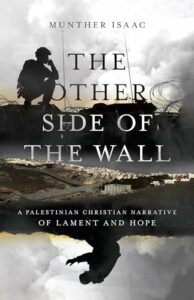 The Other Side of the Wall: A Palestinian Christian Narrative of Lament and Hope Munther Isaac (IVP) $20.00 OUR SALE PRICE = $16.00
The Other Side of the Wall: A Palestinian Christian Narrative of Lament and Hope Munther Isaac (IVP) $20.00 OUR SALE PRICE = $16.00
I have friends that helped arrange and speak at a major conference several years ago called “Christ at the Checkpoint” which called for contextualized theology set in the horror of the checkpoints, symbolizing the crass repression commonly known by Palestinians. That event and movement is now directed, actually, by this Lutheran pastor, who is pastor of — get this — Christmas Evangelical Lutheran Church in Bethlehem. Yes, that Bethlehem. You know where it is, right? This is a deeply moving story, starting with Rev. Isaac’s boyhood amidst the decades of occupation and war. As his friend Mae Elise Cannon writes, “The reading of Isaac’s Palestinian narrative in no way negates Jewish ties to the land” but it does tell an often-unheard side of the story. It is, in the words of Mark Labberton (President of Fuller Theological Seminary) “a clear, passionate, honest, rendering of this ignored and distorted narrative of Palestinian Christians.”
Did you know there is a wall encircling Bethlehem which, for many, stands as a sad symbol of the segregation between Palestinian Christians and Muslims in this era of occupation. This sort of political and social context is unsustainable Biblically speaking and Pastor Isaac — who has a PhD from the Oxford Centre for Mission Studies — exposes the disinformation and misuse of Scripture, not least around uncritical North American evangelical support for Israel.
Evangelical mission educator and leader Vinoth Ramachandra says The Other Side of the Wall is “a heart-rending cry for truth and justice on behalf of the Palestinian church.”
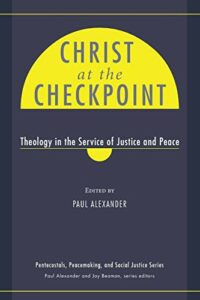 Christ at the Checkpoint: Theology in the Service of Justice and Peace edited by Paul Alexander (Pickwick Publications) $24.99 OUR SALE PRICE = $19.99
Christ at the Checkpoint: Theology in the Service of Justice and Peace edited by Paul Alexander (Pickwick Publications) $24.99 OUR SALE PRICE = $19.99
At the time of compiling and editing this, Paul was the Professor of Christian Ethics and Public Policy at Palmer Theological Seminary at Eastern University and a leader of Evangelicals for Social Action. Not bad for a Pentecostal guy (who has done remarkable research on the early anti-war views of the Assembly of God denomination.) I admire him a lot.
This book invites us to think about everything from land in the Bible to the end times, memories of the holocaust and the possibility of peace in the Middle East. Is Christian Zionism a faithful stance, and what about the possibility of a Palestinian state? Palestinian evangelicals along with others from the USA and Europe gathered to pray and talk, seeking insight about these crucial topics. This book came out of that historic event and is exceptionally important. I think it should be known as important testimony (a record of the hearts and minds of those gathered in those years) and for the wisdom and guidance that emerged. As one critic put it, “the result clarifies difficult, complex issues and points the way toward a just solution.”
There are thirteen serious chapters from authors you should know — Jonathan Kuttab, Mitri Raheb, Alex Award, Colin Chapman, Gary Burge, and Mae Elise Cannon, among others.
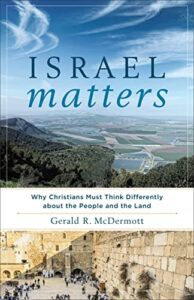 Israel Matters: Why Christians Must Think Differently about the People and the Land Gerald McDermott (Brazos Press) $19.00 OUR SALE PRICE = $15.20
Israel Matters: Why Christians Must Think Differently about the People and the Land Gerald McDermott (Brazos Press) $19.00 OUR SALE PRICE = $15.20
I suppose most BookNotes readers know that there is more than one view of the relationship of Christians and the Jews and the land of Israel. Some think that since Acts 10, at least, when the gospel went out to the Gentiles, the church of Jesus Christ is the “new Israel” mentioned in the New Testament. Such folks think that all peoples (including Jews) need Jesus and God plays no favorites, as Peter preached. Jewish or not, people need the church.
But what is the church if not a movement following the Messiah of the Old Testament people of God, grafted in to that very people of God. It isn’t hard to realize that to think about covenants and God’s promises will make complicated a simple “supersessionism” (the theology that the church replaces Israel in the grand drama of redemption.)
This book is at once wary of uncritical dispensationalist Zionism but yet, in the words of one reviewer, “not content to only take on supersessionism, McDermott reworks covenantal theology to argue that there remains a covenant with Israel, which includes the land.” Ecumenically-minded Lutheran scholar Robert Jenson (of the Center of Theological Inquiry) suggests that “this book could be a historic breakthrough.”
Israel Matters is, in the words of Rabbi Eugene Korn (of the Center for Jewish-Christian Understanding and Cooperation, in Israel)
…a balanced interpretation of Christian theological tradition regarding Judaism and a close reading of the Bible that both strengthens Christian belief and makes room for the Jewish people in their covenantal homeland.
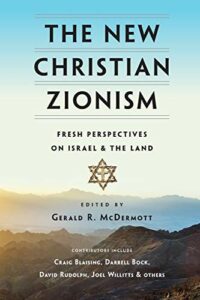 For what it is worth, after a bit of fiesty conversations around this book, Dr. McDermott — the Anglican Chair of Divinity at Beeson Divinity School — complied and edited a major volume of various contributors entitled The New Christian Zionism: Fresh Perspective on Israel & The Land (IVP Academic; $30.00 – OUR SALE PRICE = $24.00.) With serious scholars on a variety of topics, this is a major rethinking.
For what it is worth, after a bit of fiesty conversations around this book, Dr. McDermott — the Anglican Chair of Divinity at Beeson Divinity School — complied and edited a major volume of various contributors entitled The New Christian Zionism: Fresh Perspective on Israel & The Land (IVP Academic; $30.00 – OUR SALE PRICE = $24.00.) With serious scholars on a variety of topics, this is a major rethinking.
One of the chapters that might be important now is “Theology and Morality: Is Modern Israel Faithful to the Moral Demands of the Covenant in Its Treatment of Minorities?” by Shadi Khalloul.
 Zionism Through Christian Lenses: Ecumenical Perspectives on the Promised Land edited by Carole Monica Burnett (Pickwick Publications) $25.00 OUR SALE PRICE = $20.00
Zionism Through Christian Lenses: Ecumenical Perspectives on the Promised Land edited by Carole Monica Burnett (Pickwick Publications) $25.00 OUR SALE PRICE = $20.00
This is edited by a woman who is a Catholic scholar (specializing in the patristics and church fathers) who also teaches New Testament Greek at the Dominican House of Studies in Washington DC. She has several advanced degrees and here pulls together a Lutheran, two Roman Catholics, two Episcopalians, an Eastern Orthodox Christian, and a UCC pastor, all who explore the ramifications of ancient Israel’s covenant. What should we think, today?
Naturally, she invites her team to explore the early church’s theological insights as well as post-reformation experiences of these various branches of mainline Christianity. It is a rare ecumenical project and urgent, so urgent.
In the midst of the dilemma and crisis of the quest for peace, each contributor uses his or her lens to analyze the problem and offer helpful suggestions to promote a solution based on the demands of international law, as well as a solution worthy of faith in the God who loves all, cares for all people equally, and works through us to include rather than exclude the other. . . . It is time to listen to the voices of these insightful contributors. — from the foreword by Naim S. Ateek, Director, Sabeel Ecumenical Liberation Theology Center, Jerusalem
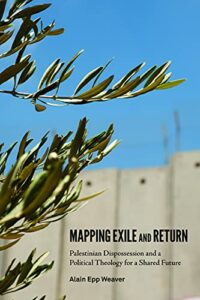 Mapping Exile and Return: Palestinian Dispossession and a Political Theology for a Shared Future Alain App Weaver (Fortress Press) $39.00 OUR SALE PRICE = $31.20
Mapping Exile and Return: Palestinian Dispossession and a Political Theology for a Shared Future Alain App Weaver (Fortress Press) $39.00 OUR SALE PRICE = $31.20
Wow, what a scholarly, imaginative, and fascinating read book this is! Weaver is a big name in the prominent Mennonite Central Committee relief organization but before his job as Director for Strategic Planning he served Palestine, Jordan, Iraq and was a project coordinator in the Gaza Strip. (Did you know that peace-loving, Jesus-following Mennonites have a presence there?) With a degree from the University of Chicago Divinity School, Epp Weaver is ecumenical and a brilliant scholar. He has written widely on the Middle East (for instance Under Vine and Fig Tree: Biblical Theologies of Land and the Palestinian-Israeli Conflict.) Weaver knows how vexing “issues facing not just theology but also political theory, sociology and other disciplines” are for this Middle Eastern conflict.
Get this: he here studies Christian appropriation of Zionism but — through an analysis of Palestinian refugee mapping practices for returning to their homeland, he argues against “political theology embedded in Zionist cartographic practices that refuse and seek to eliminate evidence of coexistence” Can we redraw the territory? Yep, he studies mapmaking as a key to understanding how home-coming is dreamed of.
As one writer said about this head volume, saying that this is a “beautifully conceived and beautifully written book.”
Stan Hauerwas exclaims:
Maps and trees: good God — is it all about maps and trees? It is about maps and trees if Alain Epp Weaver’s brave and no doubt controversial reading of the Palestinian exile and return is close to being right.
He continues,
Agree or disagree with Epp Weaver, no one will come away from reading this book without a better understanding of the complex relationship between Israel and the Palestinians. But more important is that Epp Weaver’s philosophical and theological suggestions give hope.
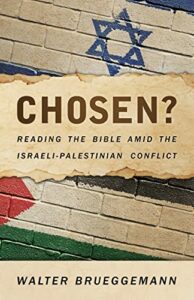 Chosen? Reading the Bible Amid the Israeli-Palestinian Conflict Walter Brueggemann (WJK) $14.00 OUR SALE PRICE = $11.20
Chosen? Reading the Bible Amid the Israeli-Palestinian Conflict Walter Brueggemann (WJK) $14.00 OUR SALE PRICE = $11.20
I’ve highlighted this before and affirm Rabbi Michel Lerner’s words when he says that “Brueggemann has done a great service to the Jewish people and to all who rely on the Hebrew Bible as a guide to life by demonstrating in the this book that there is no straight line between those ancient holy texts and the oppression of the Palestinian people by expansionist Zionist government in modern Israel.” Okay, wow.
Brueggemann is a wild scholar, a passionate thinker and preacher, and he loves justice (as he knows the God of the Bible loves justice.) He also has very close relationships with Jewish scholars and modern day Israelites. Was the promise of land to Moses permanent and irrevocable? How should we read the Bible in light of the modern situation? It is complicated and we think this is a useful tool to help us understand more of how to read the Bible well.
Chosen? has four succinct chapters and a Q & A section with Brueggemann, even a glossary of terms and a good study guide. There are even some guidelines for respectful dialogue as this could get heated. This is a good little resource and we are glad to recommend it.
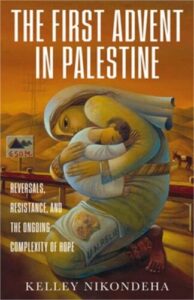 The First Advent in Palestine: Reversals, Resistance, and the Ongoing Complexity of Hope Kelley Nikondeha (Broadleaf Books) $24.99 OUR SALE PRICE = $19.99
The First Advent in Palestine: Reversals, Resistance, and the Ongoing Complexity of Hope Kelley Nikondeha (Broadleaf Books) $24.99 OUR SALE PRICE = $19.99
When we do our 2023 Advent list next week you can be assured that this will be high on that list. It came out last year and we were thrilled to recommend it. The author, as I’ve explained, has written two other excellent books — she is a white woman married to an African and has written evocatively about themes of adoption (literally and theological.) When she told me she was hoping to study this topic of Palestine by way of an Advent devotional I thought it was nothing short of brilliant.
Now, with war waging, there is a deeper urgency for this moving set of 10 good chapters. Brueggemann is right when he says as only he can that “the good new of Advent-Christmas is news that destabilizes and emancipates.”
Kelley Nikondeha eloquently weaves together the first Advent story and the present-day stories of Palestinians, creating invigorating insights for present-day Christians. Palestine then and now, its people, and the politics of the land are a common thread throughout the book, bringing us to a place to genuinely grapple with the meanings of deliverance, peace, justice, and hope. Through her personal encounters, Kelley makes the Palestinian experience visible in a world that has made them invisible. If you are looking for an Advent read that dives into new and raw paths, then The First Advent in Palestine is for you. — Shadia Qubti, Palestinian Christian peacemaker and co-producer of Women Behind the Wall podcast
After On the Incarnation by Athanasius, The First Advent in Palestine by Kelley Nikondeha is the best book I’ve read on the incarnation, peace, and hope. Buy it, read it, and embody it in your community! — Peter Heltzel, author of Resurrection City: A Theology of Improvisation
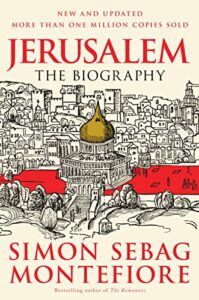 Jerusalem: The Biography Simon Sebag Montefiore (Vintage) $23.00 OUR SALE PRICE = $18.40
Jerusalem: The Biography Simon Sebag Montefiore (Vintage) $23.00 OUR SALE PRICE = $18.40
I recently started a book about entrepreneurs in Israel looking at data that explores why there is so much tech, art, so much good health, a lot of happiness regardless of attacks from neighbors and the routine threat of war. (It is called The Genius of Israel: The Surprising Resilience of a Divided Nation in a Turbulent World by Dan Señor & Saul Singer, the new follow-up to their bestselling Start-Up Nation.) I wanted something more historical, though, a really big picture. Jerusalem by Montefiore (which has sold over a million copies since its release in 2011) is magisterial, a New York Times Notable Book and a Jewish Book Council Book of the Year. This big book is what I wanted although I’ve only started it, finally. Some have said that it helps you fall in love with the city, that it is itself a treasure. Bill Clinton said it is “spectacular.”
At over 735 pages, you can imagine that it tells the whole epic history. The Wall Street Journal said it is “Magnificent… showing it’s “breathless tension.” The Economist says the author has “an elegant turn of phrase and an unerring ear for the anecdote that will cut to the heart of a story. A joy to read.” In these hard days, this might be a joyful and wise read.
+++
TO PLACE AN ORDER
PLEASE READ, THEN SCROLL DOWN AND CLICK ON THE “ORDER HERE” LINK BELOW.
It is helpful if you tell us how you want us to ship your orders.And if you are doing a pre-order, tell us if you want us to hold other books until the pre-order comes, or send some now, and others later… we’re eager to serve you in a way that you prefer.
The weight and destination of your package varies but you can use this as a quick, general guide:
There are generally two kinds of US Mail options and, of course, UPS. If necessary, we can do overnight and other expedited methods, too. Just ask.
- United States Postal Service has the option called “Media Mail” which is cheapest but can be a little slower. For one typical book, usually, it’s $4.12; 2 lbs would be $4.87. This is the cheapest method available.
- United States Postal Service has another, quicker option called “Priority Mail” which is $8.50, if it fits in a flat-rate envelope. Many children’s books and some Bibles are oversized so that might take the next size up which is $9.20. “Priority Mail” gets much more attention than does “Media Mail” and is often just a few days to anywhere in the US.
- UPS Ground is reliable but varies by weight and distance and may take longer than USPS. Sometimes they are cheaper that Priority. We’re happy to figure out your options for you once we know what you want.
If you just want to say “cheapest” that is fine. If you are eager and don’t want the slowest method, do say so. It really helps us serve you well so let us know.
BookNotes
SPECIAL
DISCOUNT
20% OFF
ALL BOOKS MENTIONED
+++
order here
this takes you to the secure Hearts & Minds order form page
just tell us what you want to order
inquire here
if you have questions or need more information
just ask us what you want to know
Hearts & Minds 234 East Main Street Dallastown PA 17313
read@heartsandmindsbooks.com
717-246-3333
Sadly, as of November 2023 we are still closed for in-store browsing. COVID is not fully over. Since few are reporting their illnesses anymore, it is tricky to know the reality but the best measurement is to check the waste water tables to see the amount of virus in the eco-system. It is bad and now getting worse. It’s important to be aware of how risks we take might effect the public good — those at risk, while not dying from the virus, are experiencing long-term health consequences. (Just check the latest reports of the rise of heart attacks and diabetes among younger adults, caused by Covid.) It is complicated, but we are still closed for in-store browsing due to our commitment to public health (and the safety of our family who live here, our staff, and customers.) Our store is a bit cramped without top-notch ventilation, so we are trying to be wise. Thanks for understanding.
We will keep you posted about our future plans… we are eager to reopen.
We are doing our curb-side and back yard customer service and can show any number of items to you if you call us from our back parking lot. It’s sort of fun, actually. We are eager to serve and grateful for your patience as we all work to mitigate the pandemic. We are very happy to help, so if you are in the area, do stop by. We love to see friends and customers.
We are happy to ship books anywhere.
We are here 10:00 – 6:00 EST / Monday – Saturday. Closed on Sunday.

